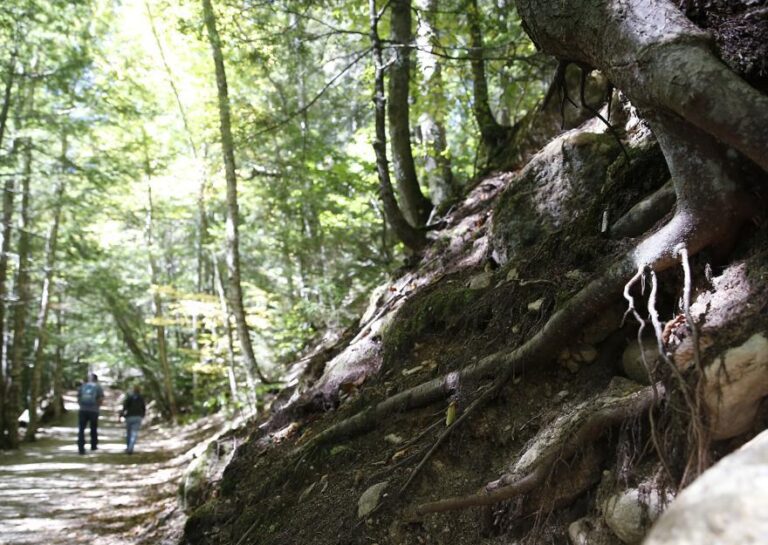Environmentalists are voicing outrage over the Trump administration’s move to invoke emergency powers to ramp up timber production from national forests in northern New England and across the country.
The bulk of the White Mountain National Forest in New Hampshire and much of the Green Mountain National Forest in Vermont were included in US Agriculture Secretary Brooke Rollins’s announcement last month that an “emergency situation’’ exists across 112.6 million acres of federally managed land.
Heightened risks for wildfires and infestation by insects and disease have contributed to “a full-blown wildfire and forest health crisis’’ across more than half of all National Forestry System land, Rollins wrote.
By invoking the emergency, Rollins said she is empowering forest managers to act with fewer constraints and strengthen the US timber industry, as President Trump aims to expand domestic timber production by 25 percent.
Rollins’s directives — which will be implemented with a series of actions outlined in a letter signed by Christopher B. French, acting associate chief of the US Forest Service — prompted outcry from some advocates in New Hampshire and Vermont who contend the Trump administration is imperiling the region’s forests by removing important safeguards.
Zack Porter, executive director of Standing Trees, an advocacy group that has opposed increased logging on public lands, said the secretary’s memo is an “outrageous’’ effort to bypass public input on how national forests should be used.
“There is no emergency in our national forests here in New England, and for that matter, national forests generally are not experiencing any emergencies of the sort that this order purports to describe,’’ he said.
“This is a deliberate attempt to confuse the public,’’ he added.
The Trump administration has repeatedly turned to its emergency powers to pursue its objectives. Since returning to office in January, Trump has declared national emergencies with regard to the Southern border, energy and critical minerals, tariffs, and more.
Rollins’s order provides an exemption from administrative processes that let outside groups challenge logging proposals before they are finalized.
Christophe Courchesne, a professor and director of the environmental advocacy clinic at Vermont Law & Graduate School, said the big concern is that the US Forest Service could try to take shortcuts in reviewing and approving projects.
Since there isn’t a factual basis to support the Trump administration’s assertion that an emergency exists, any actions taken based on Rollins’s order would be “extremely vulnerable in litigation,’’ Courchesne said.
Unlike national parks, which exist to preserve and protect natural and historic resources, national forests serve a wider range of uses, including not only environmental preservation but also human recreation and, yes, timber production.
Jack Savage, president of the Society for the Protection of New Hampshire Forests, said the government has historically used National Environmental Policy Act procedures to sort through competing interests and differing opinions on how public lands should be managed for everyone’s benefit.
“Having a rigorous process that gives lots of stakeholders a voice in what’s most important is really, really critical. . . . It should worry us if some of those processes are shortchanged,’’ he said.
At the same time, Savage said he doesn’t expect the Trump administration’s emergency declaration will eliminate all safeguards protecting the White Mountain National Forest.
“The current administration may be looking to lower or lessen the amount of process for timber sale on the national forest,’’ he said, “but there will still need to be some sort of process. I can’t imagine that it will be open season on the national forest.’’
The White Mountain National Forest, which spans nearly 800,000 acres in New Hampshire and western Maine, was created a century ago in response to a perceived emergency, after many landowners clear-cut forests unsustainably, leading to higher risks of fire and flooding and unnatural drought cycles, Savage said.
Responsible management means figuring out what will sustain the long-term health and resilience of any given stand of trees, “not necessarily looking to maximize wood withdrawal for market purposes,’’ he said.
Millions of visitors come to the White Mountain National Forest each year for outdoor recreation opportunities that include 1,200 miles of hiking trails, plus snowmobile trails and nearly two dozen campgrounds, according to the US Forest Service.
Similarly, the Green Mountain National Forest, which includes nearly 400,000 acres of federally managed land, attracts visitors with its natural beauty and archeological sites, according to the National Forest Foundation.
Savage — whose organization has sometimes disagreed with Standing Trees on the appropriateness of certain logging projects — said sourcing more wood from New England forests for use in New England construction isn’t necessarily a bad idea. But it’s important to remember that Quebec is closely intertwined with the region’s timber production, and ramping up American timber production would require more than just harvesting more wood from US forests, Savage said.
“That includes loggers and truckers and mills and so forth,’’ he said. “Trying to do that all domestically is not something you can turn on or turn off like a spigot.’’
Some groups never want to see even a single tree cut down in a national forest, said Anthony D’Amato, a professor and forestry program director at the University of Vermont.
“And that’s not necessarily constructive,’’ he said.
On the opposite end of the spectrum, those who might view the national forests as an American “woodbasket’’ ripe for unfettered logging are similarly failing to balance the competing interests at play, he said.
Even after thousands of US Forest Service workers were laid off en masse by the Trump administration, D’Amato said he trusts federal forest management professionals will continue to exercise sound judgment and strike the right balance.
“We just have moved so far in our environmental ethic, in how we connect with the land, that I have faith,’’ he said, “that those individuals tasked with doing this work will continue to sustain those values.’’
Steven Porter can be reached at steven.porter@globe.com. Follow him @reporterporter.



